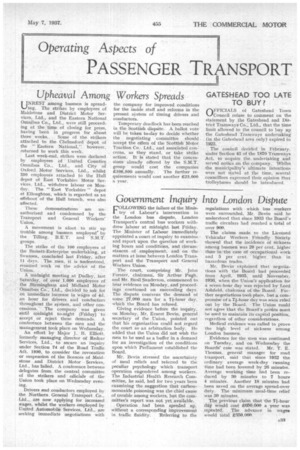Government Inquiry Into London Dispute F OLLOWING the failure of the
Page 51

If you've noticed an error in this article please click here to report it so we can fix it.
Ministry of Labour's intervention in the London bus dispute, London Transport's central bus workers withdrew labour at midnight last Friday. The Minister of Labour immediately
• appointed a court of inquiry to examine and report upon the question of working hours and ccinditions, and circumstances of employment, and on the matters at issue between London Transport and the Transport and General Workers Union.
The court, comprising Mr. John Forster, chairman, Sir .Arthur Pugh, and Mr. Basil Sanderson, commenced to heat evidence on Monday,. and proceedings continued on succeeding days. The dispute concerns the demand of some 27,000 men for a 7f-hour day, vhich the Board has refused.
Giving evidence before the inquiry, on Monday, Mr. Ernest Bevin, general secretary of the Union, pointed out that his organization could not regard the court as an arbitration body. lie added that the Union did not wish the men to be used as a buffer in a demand for an investigation of the conditions upon which Parliament established the Board.
Mr. Bevin stressed the uncertainty of meal reliefs and referred to the peculiar psychology which transport operation engendered among workers. The Industrial Health Research Committee, he said, had for two years been examining the suggestion that carbonmonoxide poisoning was the chief cause of trouble among workers, but the committee's report was not yet available.
Operation had been speeded up, without a corresponding improvement in traffic fluidity. Referring to the regulations with which bus workers were surrounded, Mr. Bevin said he understood that since 1933 the Board's traffic circulars had reached a total of over 900.
The claims made to the Licensed Vehicular Workers Friendly Society showed that the incidence of sickness among busmen was 29 per cent, higher than in the case of occupational . work and 5 per cent. higher, than in hazardous trades.
Mr. Bevin explained that negotiations with the Board bad proceeded from April, 1935, until Noveinber, 1936, when the Union's application for a seven-hour day was rejected by Lord Ashfield, chairman of the Board. Further negotiations took place, but a compromise of a 7*-hour day was soon ruled out by the Board. The Union could not agree that the Board's profits must he used to maintain its capital position, regardless of other considerations.
Medical evidence was called to prove the high level of sickness among London busmen.
Evidence for the men was continued on Tuesday, and on Wednesday the Boards' case was stated. Mr. T. E. Thomas, general manager for road transport, said that since 1932 the ordinary average week-day running time had been _Cowered by 26 minutes. Average working time had been reduced by 30 minutes to 7 hours 4 minutes. Another 18 minutes had been saved on the average spread-over duty. The minimum meal-time relief was 30 minutes,
The previous claim that the 71-hour day would cost £650,000 a year was repeated. The advance in wages would total £350,000.




















































































